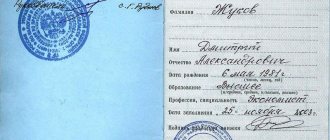What is a disciplinary sanction and the reasons for its imposition?
Judging by Article 192 of the Labor Code of the Russian Federation, the employer has the right to impose a disciplinary sanction on an employee who does not fulfill his direct duties or performs them improperly. As a rule, such a penalty is applied in the form of:
- comments;
- reprimand;
- removal from office or work.
Other types of disciplinary punishment may well be applied to some employees, which do not contradict current legislation, the organization’s charter and regulations regarding discipline. If a disciplinary punishment is applied to an employee, the employer creates an order.
When choosing a disciplinary measure, the employer is obliged to take into account all the circumstances that influenced the violation of labor discipline. In addition, it is important to establish the severity of the offense, in accordance with Part 5 of Article 192 of the Labor Code of the Russian Federation.
Application and execution of disciplinary action
In the operative part of the order, it is necessary to indicate the exact position (profession) of the employee, indicating the department, last name, first name, patronymic, the imposed disciplinary measure and material sanctions. When imposing a disciplinary sanction in the form of dismissal, the wording of the reason for dismissal must exactly correspond to the basis in the Labor Code or federal law, indicating the article and paragraph.
One of the clauses of the order to impose a disciplinary sanction and (or) material sanctions may include
its distribution to the necessary departments (accounting, structural unit where the guilty employee works, human resources department, legal service, etc.) after signing and assigning a registration number to it.
The text of the order may provide for the obligation of the immediate supervisor to familiarize the violator with this order against signature within three working days from the date of issue.
In some cases, the text of the order can contain a warning about the possible dismissal of an employee if a disciplinary offense is committed again (see paragraph 4 in Example 7).
The final decision on the type of disciplinary sanction, the application of the type and amount of material sanctions is made by the employer’s representative, who is authorized to make decisions on the hiring and dismissal of employees at the enterprise.
For a sample Order to impose a disciplinary sanction, see Example 7.
Upon review, the employee signs directly on the copy of the order imposing a disciplinary sanction.
If the employee refuses to familiarize himself, the order to impose a disciplinary sanction is announced to him by reading aloud. The fact of this kind of familiarization is recorded by the immediate supervisor by drawing up a corresponding act, which is signed by two witnesses who were present during the familiarization (see Example 8).
Removal of disciplinary sanctions
If within a year from the date of application of the disciplinary sanction the employee is not subject to a new disciplinary sanction, he is considered to have no disciplinary sanction.
The employer, before the expiration of a year from the date of application of the disciplinary sanction, has the right to remove it from the employee:
- on their own initiative,
- at the request of the employee himself,
- at the motivated request of his immediate supervisor or the workers' trade union committee.
The removal of a disciplinary sanction is formalized by an appropriate order (instruction) (see Example 9).
Legislation
| Type of recovery | Causes |
| Comment | Minor violations: being late for work, unkempt appearance (if there is a dress code), inappropriate behavior in a team, etc. |
| Rebuke | More serious offenses: systematic tardiness, absenteeism (possibly dismissal), violation of safety rules (if this did not cause damage), failure to fulfill official duties, etc. |
| Dismissal | Serious offenses specified in Art. 81 of the Labor Code of the Russian Federation: absenteeism, refusal or dishonest performance of official duties (if there is already a disciplinary sanction), being intoxicated at the workplace, committing theft at the place of work, etc. |
According to the law, an employee can be punished for one offense only once; repeated imposition of penalties is not allowed.
Order to remove the disc. collection
I was reprimanded at work. How to appeal?
Often, employers use a reprimand as a kind of educational measure towards an employee, and sometimes they use it as a way for the employee to leave the company. At the same time, employers often do not bother to prepare documentary grounds for issuing a reprimand . Since complaints about the performance of duties by an employee are not always objective, the employee has a legitimate indignation at the use of such methods and a desire to appeal .
Issuing a reprimand requires strict adherence to a certain procedure.
- An order to issue a reprimand cannot be signed in the absence of written explanations about the violation committed. Announcing a reprimand without receiving written explanations from the employee has no legal force, except in cases where the employee refused explanations (the employee’s refusal must be recorded in the form of an act, in the presence of witnesses). The employee is given at least two working days to provide explanations. This means that for an offense committed, for example, today, a reprimand cannot be issued on the same day. At least two days must pass before the necessary documents are prepared.
- In addition to explanations from the employee, in order to sign an order to issue a reprimand, written evidence must be collected of the employee’s violation of certain internal company documents (rules, job descriptions, orders), indicating the points of specific documents that the employee violated, printouts of various recording devices, and others.
- An important condition for issuing a reprimand is its duration. A reprimand order may be issued no later than one month from the date of discovery of the violation and no later than six months from the date of its commission. Managers often like to collect “compromising evidence” on their subordinates in order to, if the opportunity arises, subject them to dismissal for violations committed, for example, during the year. If the manager “did not give effect” to the facts about the commission of an offense (did not sign the order to issue a reprimand or reprimand), then he has no grounds to dismiss the employee for failure to fulfill official duties as he already has disciplinary sanctions.
- The Labor Code distinguishes three types of disciplinary sanctions: reprimand, reprimand, dismissal. When applying one or another type of disciplinary sanction, the severity of the violation must be taken into account. That is, for being five minutes late for work, a reprimand or dismissal is hardly justified if this does not entail any irreversible consequences for the company.
- If the company has a representative body of employees, then when issuing a reprimand, its opinion must be taken into account.
- A violation may result in only one disciplinary sanction. That is, you cannot be reprimanded and fired at the same time for the same violation.
- After issuing an order to issue a reprimand, the employee must be familiarized with it against signature and provided with a copy of this order. That is, the employee must understand what he violated and why exactly he was reprimanded. If an employee refuses to familiarize himself with the order, then the refusal must be recorded in an act in the presence of witnesses.
- The validity of the reprimand is limited to one year. If during this period the employer does not have any claims against the employee, the reprimand is automatically considered withdrawn. If the employee is given other reprimands, the employee risks being fired for repeated failure to perform job duties. The legislation gives the employer the right to withdraw reprimands early, before the end of the year.
Thus, issuing a reprimand requires careful paperwork and compliance with the deadlines for issuing the order, otherwise its announcement may be considered illegal. The question of the legality of issuing a reprimand involves an analysis of documents. In this regard, there are frequent cases of seeking legal assistance and a high probability of appealing against the employer’s actions. If the reprimand is issued illegally, you can appeal it by contacting the labor inspectorate or our lawyers for further appeal in court.
employee rights
Where and how can an employee challenge a disciplinary action?
Judging by Article 193 of the Labor Code of the Russian Federation, every employee who does not agree with the disciplinary measure applied to him has the right to challenge it according to the law. The appeal process is carried out by filing a complaint with the labor commission or state labor inspectorate.
If the response to the appeal is negative, the “offending” employee of the organization may appeal to the courts that protect the rights of employees.
We suggest you read: Can an employee be recalled from vacation due to illness?
To protect their own interests, each employee needs to know not only how to file a complaint, but also all the reasons why the punishment can be completely canceled. So, let’s consider a number of circumstances for canceling a disciplinary sanction:
- material, the imposition of which the employee considers the punishment illegal;
- procedural, in which the employer violates the procedure for applying punishment and its measures.
If, with a material punishment, the possibility of appeal is influenced by certain circumstances, then with a procedural one, the process of challenging depends on compliance with the procedure for imposing punishment, as provided for by law.
According to Article 193 of the Labor Code of the Russian Federation, in case of disciplinary violations, the employer is obliged to:
- Demand that the employee provide an explanation of the offense in writing. After 2 days, in the absence of an explanatory note, he has the right to draw up an act of violation.
- Create an order to impose disciplinary punishment, and then submit the document within 3 days for review by the offending employee. The employee must sign.
- If the employee does not agree to sign the document, then the employer must draw up a violation report.
Any violation of the above actions may be regarded as grounds for challenging the penalty and its cancellation in pre-trial or judicial proceedings.
How to appeal a disciplinary sanction
If an employee is sure that a disciplinary sanction was applied to him without reason, or it does not correspond to the gravity of the offense, he has the opportunity to appeal it. This right is provided for by the Labor Code of the Russian Federation.
If an employee decides to challenge the administration’s decision, he needs to familiarize himself with the rules for appealing disciplinary sanctions. 1. There are deadlines established by law, after which it will be impossible to appeal the decision. An appeal against a disciplinary sanction is allowed within three months from the moment the employee was familiarized with the order to reprimand him.
As for dismissal, the appeal period is reduced to one month. The countdown begins from the moment the former employee receives the work book and a copy of the dismissal order.
Grounds for appealing a disciplinary sanction:
- Application of a penalty without the employee writing an explanatory note and considering the case.
- Reprimand or dismissal for absence from work if the employee was sick at the time and has sick leave.
- Application of several penalties for the same violation.
- There were errors in the order to apply disciplinary sanctions.
Where to file a complaint.
To appeal a disciplinary sanction, there is a labor inspectorate, a commission on service and labor disputes, as well as judicial authorities. You can try to appeal the reprimand in the commission, and if the employee is not satisfied with the decision, go to court. But you should appeal against unfair dismissal immediately in the courts, bypassing the lower authorities.
How to make your appeal successful.
In order for an appeal to court or a labor commission to have a positive result for an employee, a number of requirements must be met. Firstly , apply no later than the deadline specified in the law (the sooner the better). Secondly , correctly draw up a statement in which you present all the facts proving the innocence of the victim and the illegality of the administration’s actions. Thirdly , collect, if available, supporting documents, find witnesses. If you have any difficulties with drawing up an application or selecting arguments, you should contact lawyers who can provide qualified assistance.
You might be interested:
— Limitation periods for labor disputes.
— Dismissal according to the Labor Code. Grounds for dismissal
— What to do if you are forced to quit your job?
If you need more detailed advice, you can contact our disciplinary lawyer.
Sign up for a consultation
Consequences of a reprimand
In order for the reprimand to be legal and the employee cannot appeal it, the manager must follow the algorithm of actions established by Art. 193 Labor Code of the Russian Federation:
- Conduct an internal investigation to determine the cause and establish the employee’s guilt in the violation.
- Request an explanatory note from the guilty employee. He must provide it within 2 working days. If this does not happen, an act of refusal to provide explanations is drawn up.
- Draw up an order to issue a reprimand, explaining the reasons and grounds, as well as indicating the details of the offending subordinate.
- Within three working days from the date of drawing up, give the order for signature to the employee in respect of whom it is issued. If he refuses to sign the document, an order to this effect is drawn up.
Failure to provide an explanatory note or refusal to sign the order is not grounds for canceling the penalty procedure.
In addition to the reprimand, he may be deprived of a bonus, but there are some features here:
- If the internal regulations of the organization indicate that employees can be deprived of bonuses only for disciplinary action, they cannot be deprived of bonuses without a reprimand.
- If the organization has a document regulating fines and depreciation for certain violations, and all subordinates are familiar with it against signature, the employer can deprive bonuses without issuing reprimands.
Employers must also comply with the deadlines for bringing them to disciplinary liability: no later than one month from the moment the violation was discovered or six months from the date of commission. If the misconduct was discovered during an accounting or audit, the deadlines are extended to two years from the date of commission.
The most serious consequence is dismissal. Disciplinary punishment is imposed for 1 year from the date of execution of the order (Article 194 of the Labor Code of the Russian Federation), and earlier it can only be removed by the manager if he is sure that the employee has changed his attitude towards work in a positive direction.
We invite you to familiarize yourself with: Power of attorney to represent the interests of the defendant in court
If an employee who has an outstanding penalty commits an offense again, the employer has the right to dismiss him.
Disciplinary action. What is the danger for the employee?
Relationships with your manager at work do not always work out the way you would like. For various reasons, you may fall out of favor with your boss and are now beginning to get entangled in cleverly placed networks. First, you are given a reprimand, most often, from your point of view, unfair, then a second one and you understand that the next disciplinary sanction will be dismissal, or you will have to accept the conditions of your boss, which, most likely, he sought, which contradict your principles or you are not satisfied. There is no need to despair and if you are not going to change your job, we will try to resolve the situation. First of all, if the manager sees that you are legally enlightened, then in order to bring the employee to disciplinary liability without breaking the law, he needs to work hard. The basis for bringing an employee to disciplinary liability is a disciplinary offense, i.e. failure to perform or improper performance of job duties without good reason. The first thing you should carefully study is the local regulations in force in the organization, which stipulate your duties and responsibilities. In particular, this is an employment agreement or contract, job description, agreement on financial responsibility, internal labor regulations, regulations on remuneration and others, orders of the manager, and the like. Please note that all documents have your signature confirming that you are familiar with the document. Secondly, if there is a violation of your labor obligations, this must be recorded by the manager in an act or memo from your immediate supervisor, and you, in turn, must be familiarized with the specified documents against signature. Helpful advice: do not refuse to sign the documents that the manager introduces you to; in case of refusal, it will not be difficult for the manager to draw up the corresponding act in the presence of two employees. By signing the act, you can express your disagreement, or any other opinion, by making a note before signing. Thirdly, the application of a disciplinary sanction is considered illegal if the employer does not require an explanation from you in writing. Do not rush immediately, at the request of the manager, to give written explanations, calm down, weigh everything correctly and try to express your point of view, if possible, indicating good reasons. It should be noted that there are mistakes on the part of the employer when there is neither an explanation nor an act. In this case, the disciplinary sanction is not legal. Fourthly, keep in mind that the disciplinary sanction is applied no later than one month from the date of discovery of the misconduct, i.e., the day on which the act was drawn up or the report was submitted. A disciplinary sanction cannot be applied later than six months, and based on the results of an inspection or audit - later than two years from the date of the disciplinary offense. If the manager missed the specified deadlines and still applied disciplinary measures, the manager’s actions are illegal, and you have the right to appeal his decision. Please note that labor legislation establishes an exhaustive list of penalties: reprimand, reprimand, dismissal on appropriate grounds and no tyranny by the employer, in particular, fines, deprivation of various types of allowances, reprimand with warning and other sanctions are not allowed. The employer has the right to deprive the employee only of those benefits that he himself provided by local regulations, in excess of those established by labor legislation. Finally, only one disciplinary action may be taken for each offense. The procedure for applying a disciplinary sanction ends with the issuance of an order, which must indicate the specific disciplinary offense, the type of penalty and a link to the relevant article of the Labor Code or a local regulatory act. If, nevertheless, the manager decides to discipline you and announces a reprimand or reprimand, do not panic, after all, disciplinary measures are temporary and are valid for a year from the date of application. After a year, the penalty is lifted automatically and the employee is considered to have no disciplinary sanction unless he is again subjected to a new disciplinary sanction. At the request of the employee or at the request of his immediate supervisor, the employer may make, at any time, a decision to early lift the disciplinary sanction if the employer will think that the lesson benefited you. If the procedure and grounds for applying a disciplinary sanction are violated, the employee has the right to restore his labor rights by filing a complaint with the state labor inspectorate or the labor dispute commission. The court considers issues when the disciplinary measure is dismissal and, during the consideration of the case, an assessment is made about the legality of the application of disciplinary measures preceding dismissal. If, nevertheless, you have become a victim of your boss, leave your emotions, carefully read all the documents drawn up, ask for copies of local regulations where your signature must be, use the services of lawyers. However, do not forget that resolving any conflict peacefully is always better than war.
How can an employee appeal a disciplinary sanction to the State Labor Inspectorate (GIT)?
The State Labor Inspectorate is obliged to protect the rights of the employee on the basis of Article 355 of the Labor Code of the Russian Federation. Let's take a closer look at the step-by-step instructions for challenging a disciplinary punishment through this government agency:
- First, the employee is required to make a written complaint against the employer, indicating his full name, the name of the organization in which he works, as well as information about the management.
After this, the employee must explain the essence of the matter in detail. At the bottom of the document he needs to sign with a transcript and the date of writing. He can send the signed complaint by registered mail to Russia or hand it over personally to the state labor inspectorate.
- After receiving a complaint, the State Labor Inspectorate is obliged to conduct an inspection and make a decision. Review and verification usually takes no more than 30 calendar days. If the result is positive for the employee, the state labor inspectorate sends an order to the employer obliging him to lift the disciplinary sanction.
In case of disagreement with the decision, the employer has the right to appeal it through:
- the direct supervisor of the employee who made such a conclusion;
- Head of the State Labor Inspectorate of the Russian Federation;
- judicial authority in accordance with Article 361 of the Labor Code of the Russian Federation.
APPEAL AND REMOVAL OF DISCIPLINARY PENALTIES
An employee, regardless of whether a fixed-term or open-ended employment contract has been concluded with him, as well as whether he is a main employee or a part-time worker, is obliged to perform the work determined by this contract, subject to the internal labor regulations (Article 21 of the Labor Code). Work conscientiously and honestly, carry out the employer’s orders in a timely and accurate manner, observe labor and technological discipline, the requirements of regulations on labor protection, and treat the owner’s property with care (Article 139 of the Labor Code). Violation of labor discipline by an employee, failure to perform or improper performance of the labor duties assigned to him is the basis for bringing him to disciplinary liability.
Disciplinary liability consists of applying disciplinary sanctions to the employee, which, according to Art. 147 of the Labor Code, there may be a reprimand or dismissal.
In cases where an employee believes that a disciplinary sanction was applied to him unlawfully or the procedure for bringing disciplinary liability was violated (for example, violation of the terms of application, the violator was not offered to give a written explanation, etc.), he can appeal his disciplinary liability in in accordance with the procedure established by current legislation.
Unlike disciplinary dismissal, which can only be appealed in court within a month from the date of delivery of a copy of the dismissal order or from the date of issuance of the work book, a reprimand can be appealed by contacting the labor dispute commission or the district (city) court in accordance with Articles 225, 233 of the Labor Code, within three months from the day the employee learned or should have learned of a violation of his right. Such a day should be considered the day the employee familiarizes himself with the order (instruction) reprimanding him, regardless of the day this order was issued.
Article 151 of the Labor Code provides for the procedure for removing a reprimand. If within a year from the date of imposition of a disciplinary sanction - a reprimand, the employee is not subject to a new disciplinary sanction, he is considered to have no disciplinary sanction.
If the employee has not committed a new violation of labor discipline and, moreover, has proven himself to be a conscientious worker, the reprimand can be withdrawn before the end of one year. The initiator for the early removal of a reprimand is usually the head of the department in which the employee who received the reprimand, team or other team works. Such an initiative can be formalized as a presentation, a petition, a memo from an official, a decision of a general meeting of the relevant labor collective, and the like. Since the legislation does not directly stipulate who such an initiator can be, then, accordingly, it can be the employee himself, who can contact the employer with an appropriate application for early removal of the reprimand, indicating in this application arguments about the possibility of early removal of the disciplinary sanction.
Most common mistakes
Error 1. Failure to provide an explanatory note at the request of the manager.
This will not help you avoid liability, but during legal proceedings it may be difficult to prove your innocence.
Error 2. The deadline for appealing a disciplinary sanction cannot be restored.
Restoration is quite possible, but only when the deadlines were missed for valid reasons: illness, caring for an elderly relative or child, staying in another country, etc. First, a claim is filed for reinstatement, then for cancellation of the reprimand.
How can an employee challenge a disciplinary sanction through the CCC?
The LCC (labor dispute commission) includes an equal number of employee and employer representatives. It is being created on their joint initiative in accordance with Article 384 of the Labor Code of the Russian Federation.
We invite you to read: Response to unilateral termination of a contract
To challenge a disciplinary punishment through the CTS, an employee must:
- Submit an application in free form, indicating in the text all personal data and information about the employer. The document must be completed in 2 copies and must be registered.
- Wait for the case to be considered, which is carried out by voting.
- Receive a decision within 3 days from the date of its adoption.
The applicant has the right to challenge the disciplinary sanction again no later than ten days after receiving it in accordance with Article 390 of the Labor Code of the Russian Federation.
Where to contact
You can challenge a disciplinary sanction in the inspection, commission (KTS), or in court. The procedure will depend on the authority.
Labour Inspectorate
When contacting the labor inspectorate, you must be guided by this algorithm:
- Filing a complaint. The complaint may be submitted in written or electronic form. To submit electronically, you need to use the “OnlineInspection.RF” website. A written complaint is made in free form. However, the document must contain this information: full name of the applicant, contact information, information about the employer, full name of the manager. You need to present all the circumstances of the case and your reasoning. A date and signature are also required. You can submit a complaint in person. An alternative option is a registered letter with an inventory and notification of delivery.
- Getting a response. If the labor inspectorate considers the complaint to be justified, the employer's company will be inspected for violations. Based on the results of the inspection, an order to cancel the penalty is issued.
IMPORTANT! An employee needs to be prepared that his problem will not be solved instantly. The complaint will be considered within 30 days.
Labor Dispute Commission
The Labor Dispute Commission also has the power to cancel a penalty. It can be formed at the initiative of employees (grounds - Articles 384 and 385 of the Labor Code of the Russian Federation). Let's consider the algorithm for contacting the CTS:
- Drawing up an application. The application is completed in free form. However, it must necessarily include this information: full name, circumstances and essence of the complaint, requirements. The document must be dated and signed. It is recommended to complete the application in two copies. One of them remains with the employee. It must be marked with the date of receipt of the document. This paper will confirm that the employee filed a complaint. The employee needs to ensure that the application is registered. The mandatory registration is stipulated by Part 1 of Article 387 of the Labor Code of the Russian Federation.
- Receiving a response from the commission. The CCC considers the complaint within 10 days on the basis of Part 2 of Article 387 of the Labor Code of the Russian Federation.
Based on the results of consideration of the application, a meeting is formed. It must be attended either by the employee himself or his representative. The employee can also submit an application requesting that the dispute be considered without his personal participation. The corresponding right is given in Part 3 of Article 387 of the Labor Code of the Russian Federation. Within 3 days from the date of consideration of the dispute, the employee receives a copy of the decision. It must be signed by the chairman of the commission and certified by a seal (based on Part 3 of Article 388 of the Labor Code of the Russian Federation). Within 10 days after the commission's decision is made, you can appeal it. To appeal, you need to go to court on the basis of Part 2 of Article 390 of the Labor Code of the Russian Federation.
IMPORTANT! If the commission has not considered the complaint in the proper manner, the dispute can be transferred to the level of judicial proceedings (Article 386 of the Labor Code of the Russian Federation).
Court
Going to court is considered the most effective tool for appeal. Let's consider the algorithm of actions:
- Drawing up a statement of claim. The claim must be filed with the judicial authority at the address of the employer's company. The application must contain this information: name of the court, full name and address of the plaintiff, name and address of the defendant, essence of the case, circumstances, argumentation. If the claim is subject to assessment, its value must be indicated. The application must also indicate a list of attached documents. The relevant requirements for the claim are contained in Part 2 of Article 131 of the Code of Civil Procedure of the Russian Federation. The application is signed either by the employee or his legal representative (Part 4 of Article 131 of the Code of Civil Procedure of the Russian Federation).
- Submitting an application. A number of documents must be attached to the application: copies of the claim according to the number of parties to the case, a power of attorney from the representative, documents confirming the stated circumstances, calculation of the amount of recovery. This list of documents is specified in Article 132 of the Code of Civil Procedure of the Russian Federation. If a particular court allows it, you can file a claim electronically.
- Participation in a court hearing. It is advisable that the employee appear at the meeting in person. If this is not possible, you need to send a notice of your absence and attach documents confirming valid reasons. For example, this could be a sick leave certificate. If the reason for failure to appear is considered valid by the court, the hearing is postponed. The plaintiff can also ask the court to consider the case without him.
- Getting a solution. The court decision can be obtained in person in court. If a person was not present at the meeting, a copy of the decision is sent to him by mail within 5 days (Part 1 of Article 214 of the Code of Civil Procedure of the Russian Federation). The decision comes into force within a month. During this period, the employee can file an appeal.
Let's consider the consequences of making a decision in favor of the employee. If an employee does not receive a bonus due to a penalty, the employer is obliged to pay it with interest (based on Article 236 of the Labor Code of the Russian Federation).
ATTENTION! Employees who initiate labor disputes are exempt from paying fees.
FAQ
Question No. 1. Can my boss fire me for absenteeism if I already have a reprimand for being late?
To dismiss for absenteeism, it is not necessary to have a valid penalty - the manager can do this on the basis of Art. 81 Labor Code of the Russian Federation.
Question No. 2. If an employee does not come to work for a good reason, do I need to provide evidence?
Yes, this is necessary, otherwise the employer has every right to reprimand. If the cause was an accident, illness, accident with a loved one, you will need supporting certificates.
Conclusion
Subject to all the rules, an employee can independently appeal a reprimand issued against him if he considers that the punishment was applied unlawfully. If the manager refuses to lift the punishment through a peaceful agreement, the court, the Trade Union or the Labor Safety Inspectorate will come to the employee’s aid.
When can you challenge a disciplinary punishment before going to court?
When contacting government agencies dealing with labor relations issues in order to challenge a disciplinary punishment, the employee is given 90 days from the date of creation of the order. If the specified period was missed by the employee for a good reason, then it can be restored.
Reasons recognized as officially valid are not defined at the legislative level. Typically these include reasons why the employee was unable to file a complaint. For example, an illness confirmed by a doctor’s certificate.








